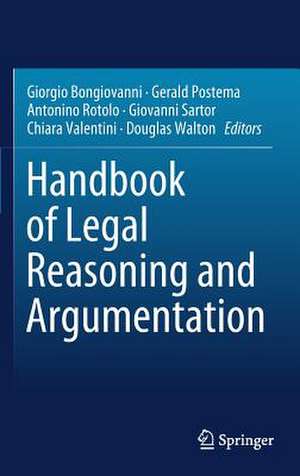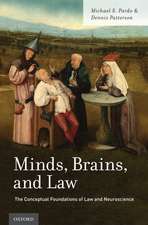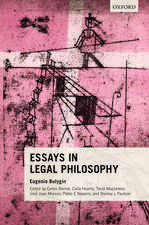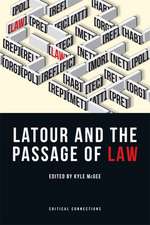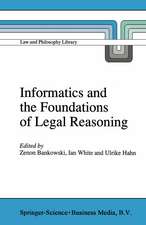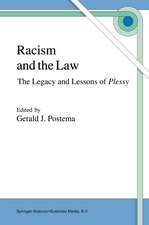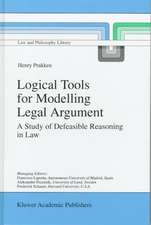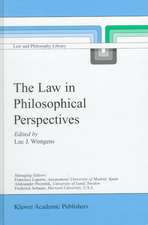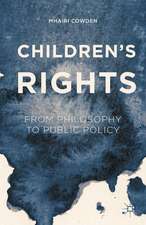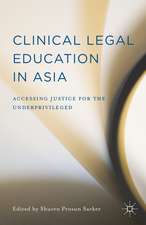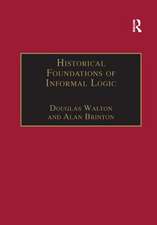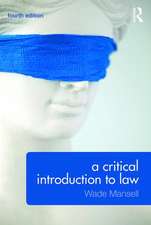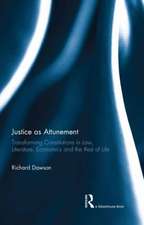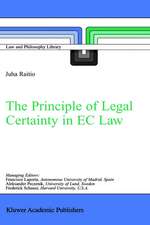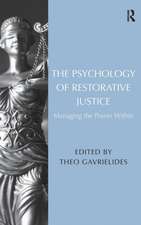Handbook of Legal Reasoning and Argumentation
Editat de Giorgio Bongiovanni, Gerald Postema, Antonino Rotolo, Giovanni Sartor, Chiara Valentini, Douglas Waltonen Limba Engleză Hardback – 14 iul 2018
| Toate formatele și edițiile | Preț | Express |
|---|---|---|
| Paperback (1) | 2111.29 lei 6-8 săpt. | |
| SPRINGER NETHERLANDS – 29 dec 2018 | 2111.29 lei 6-8 săpt. | |
| Hardback (1) | 2117.76 lei 6-8 săpt. | |
| SPRINGER NETHERLANDS – 14 iul 2018 | 2117.76 lei 6-8 săpt. |
Preț: 2117.76 lei
Preț vechi: 2582.63 lei
-18% Nou
Puncte Express: 3177
Preț estimativ în valută:
405.36€ • 440.46$ • 340.72£
405.36€ • 440.46$ • 340.72£
Carte tipărită la comandă
Livrare economică 21 aprilie-05 mai
Preluare comenzi: 021 569.72.76
Specificații
ISBN-13: 9789048194513
ISBN-10: 9048194512
Pagini: 550
Ilustrații: XXIII, 764 p. 71 illus.
Dimensiuni: 155 x 235 x 50 mm
Greutate: 1.27 kg
Ediția:1st ed. 2018
Editura: SPRINGER NETHERLANDS
Colecția Springer
Locul publicării:Dordrecht, Netherlands
ISBN-10: 9048194512
Pagini: 550
Ilustrații: XXIII, 764 p. 71 illus.
Dimensiuni: 155 x 235 x 50 mm
Greutate: 1.27 kg
Ediția:1st ed. 2018
Editura: SPRINGER NETHERLANDS
Colecția Springer
Locul publicării:Dordrecht, Netherlands
Public țintă
ResearchCuprins
Contributors. - Introduction.- PART I Basic Concepts for Legal Reasoning.- Chapter 1 Reasons (and Reasons in Philosophy of Law); Giorgio Bongiovanni.- Chapter 2 Reasons in Moral Philosophy; Carla Bagnoli.- Chapter 3 Legal Reasoning and Argumentation; Douglas Walton.- Chapter 4 Norms in Action: a Logical Perspective; Emiliano Lorini.- Chapter 5 Of Norms; Jaap Hage.- Chapter 6 Values; Carla Bagnoli.- Chapter 7 The Goals of Norms; Cristiano Castelfranchi.- Chapter 8 Authority; Kenneth E. Himma.- Chapter 9 The Authority of Law; Veronica Rodriguez-Blanco.- PART II Kinds of Reasoning and the Law.- Chapter 1 Deductive and Deontic Reasoning; Antonino Rotolo.- Chapter 2 Inductive, Abductive, and Probabilistic Reasoning; Burkhard Schafer and Colin Aitken.- Chapter 3 Defeasibility in Law; Giovanni Sartor.- Chapter 4 Analogical Arguments; Bartosz Brożek.- Chapter 5 Choosing Ends and Choosing Means: Teleological Reasoning in Law; Lewis Kornhauser.- Chapter 6 Interactive Decision-Making and Morality; Wojciech Zaluski.- PART III Special Kinds of Legal Reasoning.- Chapter 1 Evidential Reasoning; Marcello Di Bello and Bart Verehij.- Chapter 2 Interpretative Arguments and the Application of the Law; José Juan Moreso and Samuele Chilovi.- Chapter 3 Statutory Interpretation as Argumentation; Fabrizio Macagno, Giovanni Sartor, and Douglas Walton.- Chapter 4 Varieties of Vagueness in the Law; Andrei Marmor.- Chapter 5 Balancing, Proportionality and Constitutional Rights; Giorgio Bongiovanni and Chiara Valentini.- Chapter 6 Coherence and Systematization in Law; Maria Amalia Amaya Navarro.- Chapter 7 Precedent and Legal Analogy; Kevin Ashley.- Chapter 8 Economic Logic and Legal Logic; Lewis Kornhauser.- Index of Names.- Index of Subjects.
Notă biografică
Giorgio Bongiovanni is Professor of Philosophy of Law at the University of Bologna Law School (Italy). He has published widely in constitutional theory, legal theory, metaethics and normative ethics, the theory of legal interpretation, the foundations of practical reason, the history of legal theory and philosophy, and the history and philosophy of politics. His works include, among others, a monographic volume on legal theory and constitutionalism (Laterza, 2005), and the editorship (with G. Sartor and C. Valentini) of the volume Reasonableness and Law (Springer, 2009). He also edited two books, respectively, on moral objectivism (B. Mondadori, 2007) and (with G. Gozzi) on the philosophy of international law (Il Mulino, 2006). He is associate editor of Ratio Juris: An International Journal of Jurisprudence and Philosophy of Law (Wiley-Blackwell). Gerald
J. Postema is Cary C. Boshamer Professor of Philosophy and Professor of Law at the Universityof North Carolina at Chapel Hill (USA). He has published extensively in legal and political philosophy and ethics. He wrote, among others, Bentham and the Common Law Tradition (Clarendon 1986/1989) and edited Racism and the Law (Kluwer 1997); Rationality, Conventions, and the Law (Kluwer 1998); Jeremy Bentham: Moral, Political, and Legal Philosophy (Ashgate 2002) and Philosophy and the Law of Torts (CUP 2001). He is associate editor of the multi-volume work A Treatise of Legal Philosophy and General Jurisprudence (Springer). Former Guggenheim and Rockefeller fellow, and fellow of the Netherlands Institute for Advanced Studies and the National Humanities Center, he was editor of Cambridge Studies in Philosophy and Law and special issues editor of Law and Philosophy.
Antonino Rotolo is Associate Professor of Philosophy of Law at the University of Bologna Law School (Italy). He published two monographic volumes about reasoning by analogy in the law (Clueb, 2001) and multi-modal logics for modeling the interaction between agents and normative systems (Gedit, 2002). He has also extensively written on formal methods for practical and legal reasoning, logics for artificial intelligence, artificial intelligence and law, and philosophical logic. He served as a reviewer for many international journals and as a member of the programme committee of international conferences and workshops. He is assistant editor of Ratio Juris: An International Journal of Jurisprudence and Philosophy of Law (Wiley-Blackwell) and A Treatise of Legal Philosophy and General Jurisprudence (Springer).
Antonino Rotolo is Associate Professor of Philosophy of Law at the University of Bologna Law School (Italy). He published two monographic volumes about reasoning by analogy in the law (Clueb, 2001) and multi-modal logics for modeling the interaction between agents and normative systems (Gedit, 2002). He has also extensively written on formal methods for practical and legal reasoning, logics for artificial intelligence, artificial intelligence and law, and philosophical logic. He served as a reviewer for many international journals and as a member of the programme committee of international conferences and workshops. He is assistant editor of Ratio Juris: An International Journal of Jurisprudence and Philosophy of Law (Wiley-Blackwell) and A Treatise of Legal Philosophy and General Jurisprudence (Springer).
Giovanni Sartor is Marie-Curie Professor of Legal Informatics and Legal Theory at the European University Institute of Florence and Professor of Computer and Law at the University of Bologna (Italy), after obtaining a PhD at the European University Institute (Florence), working at the Court of Justice of the European Union (Luxembourg), being a researcher at the Italian National Council of Research (ITTIG, Florence), and holding the chair in Jurisprudence at Queen’s University of Belfast (where he now is honorary professor). He is author of ten books (among which, Legal Reasoning: A Cognitive Approach to the Law, Springer, 2005 and Artificial Intelligence in Law, Tano, 1993) and has published widely in legal philosophy and legal theory, legal informatics (artificial intelligence and law), computational logic, legislation technique, and computer law. He is co-editor of the journal Artificial Intelligence and Law (Springer).
Douglas Walton holds the Assumption Chair in Argumentation Studies and is Distinguished Research Fellow of the Centre for Research in Reasoning, Argumentation and Rhetoric (CRRAR) at the University of Windsor, Canada. He is the author of over thirty-five books in the areas of argumentation, logic and artificial intelligence. They include, most recently, Witness Testimony Evidence (CUP, 2008), Dialog Theory for Critical Argumentation (J. Benjamins, 2007), Media Argumentation (CUP, 2007), and Fundamentals of Critical Argumentation (CUP, 2006). He is co-editor of Critical Argumentation book series for Cambridge University Press, and serves on the editorial boards of the Argumentation Library book series for Springer. He is on the editorial boards of the journals Argumentation and Advocacy, Artificial Intelligence and Law, Informal Logic, Philosophy & Rhetoric and Revista Iberoamericana de Argumentación.
Douglas Walton holds the Assumption Chair in Argumentation Studies and is Distinguished Research Fellow of the Centre for Research in Reasoning, Argumentation and Rhetoric (CRRAR) at the University of Windsor, Canada. He is the author of over thirty-five books in the areas of argumentation, logic and artificial intelligence. They include, most recently, Witness Testimony Evidence (CUP, 2008), Dialog Theory for Critical Argumentation (J. Benjamins, 2007), Media Argumentation (CUP, 2007), and Fundamentals of Critical Argumentation (CUP, 2006). He is co-editor of Critical Argumentation book series for Cambridge University Press, and serves on the editorial boards of the Argumentation Library book series for Springer. He is on the editorial boards of the journals Argumentation and Advocacy, Artificial Intelligence and Law, Informal Logic, Philosophy & Rhetoric and Revista Iberoamericana de Argumentación.
Textul de pe ultima copertă
This handbook addresses legal reasoning and argumentation from a logical, philosophical and legal perspective. The main forms of legal reasoning and argumentation are covered in an exhaustive and critical fashion, and are analysed in connection with more general types (and problems) of reasoning. Accordingly, the subject matter of the handbook divides in three parts. The first one introduces and discusses the basic concepts of practical reasoning. The second one discusses the general structures and procedures of reasoning and argumentation that are relevant to legal discourse. The third one looks at their instantiations and developments of these aspects of argumentation as they are put to work in the law, in different areas and applications of legal reasoning.
Caracteristici
The only work to provide a comprehensive, thematic and systematic account of legal reasoning The first work on legal reasoning which systematically discusses it in relation to logics and philosophies of practical reason A multidisciplinary focus provides a good balance of formal (logical), philosophical and legal aspects
